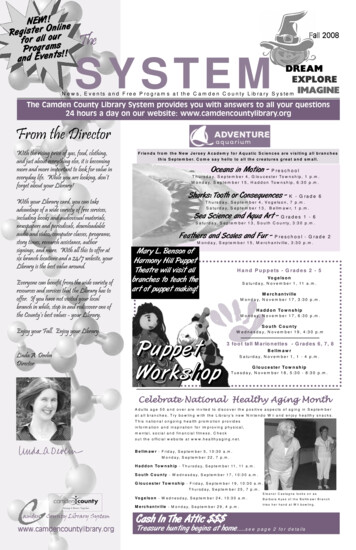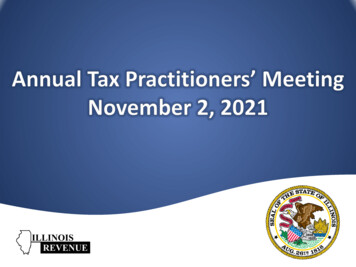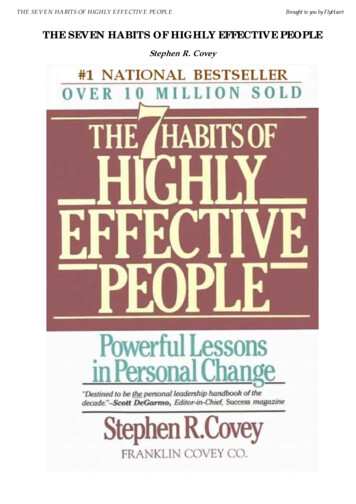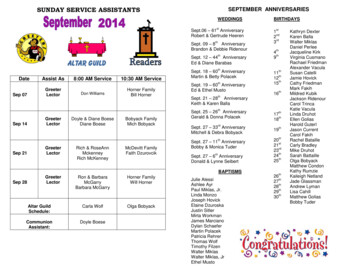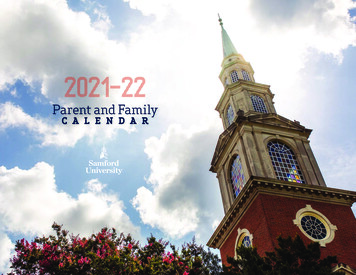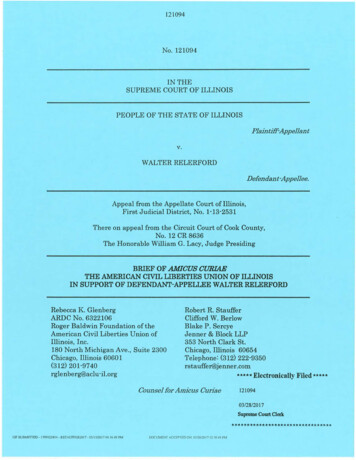
Transcription
121094No. 121094IN THESUPREME COURT OF ILLINOISPEOPLE OF THE STATE OF ILLINOISPlaintiff-Appellantv.WALTER RELERFORDDefendant-Appellee.Appeal from the Appellate Court of Illinois,First Judicial District, No. 1-13-2531There on appeal from the Circuit Court of Cook County,No. 12 CR 8636The Honorable William G. Lacy, Judge PresidingBRIEF OF AM/CUB CURIAETHE AMERICAN CML LIBERTIES UNION OF ILLINOISIN SUPPORT OF DEFENDANT-APPELLEE WALTER RELERFORDRebecca K. GlenbergARDC No. 6322106Roger Baldwin Foundation of theAmerican Civil Liberties Union ofIllinois, Inc.180 North Michigan Ave., Suite 2300Chicago, Illinois 60601(312) 201-97 40rglenberg@aclu-il.orgRobert R. StaufferClifford W. BerlowBlake P. SercyeJenner & Block LLP353 North Clark St.Chicago, Illinois 60654Telephone: (312) 222-9350rstauffer@jenner.comCounsel for Amicus Curiae*****Electronically Filed*****12109403/28/2017Supreme Court Clerk*********************************l2F SUBMITIED- 1799923854 - RSTAUFFER2017 - 03/15/2017 04 36 49 PMDOCUMENT ACCEPTED ON: 03128/2017 12:50:49 PM
121094POINTS AND AUTHORITIESINTERESTS OF THE AMICUS . . . . . . . . . . . . lSUMMARY OF ARGUMENT . l720 ILCS 5/12-7.3 (2012) . . . . . . . . . . 1720 ILCS 5/12-7.5 (2012) . . . . 1ARGUMENT . . . . . . . . 3I.The Statutes Violate The First Amendment Because They AreOverbroad In Their Reach . . . . 3A.The Statutes Impermissibly Criminalize Speech ThatWas Not Intended To Cause Harm . 3720 ILCS 5/12-7.3 (2012) . . . 3720 ILCS 5/12-7 .5 (2012) . . . . . . . . . 3Rogers v. United States,422 U.S. 35 (1975) . . . 4Chaplinsky v. New Hampshire,315 U.S. 568 (1942) . . . 4People v. Heinrich,104 Ill. 2d 137 (1984) . 4United States v. X-Citement Video, Inc.,513 U.S. 64 (1994) . . . . . . . . . . 3People v. Stiles,334 Ill. App. 3d 953 (1st Dist. 2002) . 3Morissette v. United States,342 U.S. 246 (1952) . . . . . . . . . 3People v. Gean,143 Ill. 2d 281 (1991) . . . . . . . . . . . . . . . . 3McMillan v. Pennsylvania,477 U.S. 79 (1986) . . . . . . . . . . . 4l12F SUBMITTED· 1799923854 RSTAUfPER2017 · 03/15/2017 04:36:49 PMDOCUMENT ACCEPTED ON: 03/28/201712:50:49PM
1210941.The Statutes Do Not Provide For AConstitutionallyAdequateMens ReaElement . . . . . . . . . . 4Watts v. United States,394 U.S. 705 (1969) (per curiam) . . . 4, 5, 7Imperial Apparel, Ltd. v. Cosmo's DesignerDirect, Inc.,227 Ill. 2d 381 (2008) . 5Virginia v. Black,538 U.S. 343 (2003) . 6Rogers v. United States,422 U.S. 35 (1975) . 6City of Chicago v. Pooh Bah Enterprises,Inc.,224 Ill. 2d 390 (2006) . . 6Brandenburg v. Ohio,395 U.S. 444 (1969) . . . . . . . . . . 7NAACP v. Claiborne Hardware Co.,458 U.S. 886 (1982) . 7Colson v. Stieg,89 Ill. 2d 205 (1982) . 7People v. Dye,2015 IL App (4th) 130799 . 6People v. Diomedes,2014 IL App (2d) 121080 . . . . 6People v. Sikora,32 Ill. 2d 260 (1965) . . . . 62.A Subjective Intent Element Is Even MoreCrucial Where A Statute Purports ToRegulateSpeechCausing "EmotionalDistress." . 8720 ILCS 5/12-7.3 (2012) . . . . 8720 ILCS 5/12-7.5 (2012) . . . . 81112F SUBMITIED 1799923854 -RSTAUFFER2017 03/15/2017 04:36:49 PMDOCUMENT ACCEPTED ON: OJ/28/20l7 l2:50:49PM
121094Hustler Magazine, Inc. v. Falwell,485 U.S. 46 (1988) . . . . 83.The Statutes Must Have A Subjective IntentElement Because Of Their Impact On OnlineSpeech. . . . . . 9Reno v. ACLU,521 U.S. 844 (1997) . 10Hadley v. Doe,2014 IL App (2d) 130489 . . 10Danah Boyd, It's Complicated: The SocialLives ofNetworked Teens (2014) . 10B.The Statutes Impermissibly Criminalize Speech ThatDoes Not Harm Any Supposed Victim . 11720 ILCS 5/12-7.3 (2012) . . . . . . 11720 ILCS 5/12-7.5 (2012) . . 11People v. Clark,2014 IL 115776 . . 11People v. Melongo,2014 IL 114852 . 11II.The Statutes Violate The First Amendment Because They Do NotWithstand Strict Scrutiny. 12Arcara v. Cloud Books, Inc.,478 U.S. 697 (1986) . 12People v. Minnis,2016 IL 119563. . . . 12People v. Jones,188 Ill. 2d 352 (1999) . . 12United States v. Alvarez,132 S. Ct. 2537 (2012) . 12Sable Communications of California, Inc. v. FCC,492 U.S. 115 (1989) . 1311112F SUBMlITED 1799923854 RSTAUFFER2017 03 / 15/2017 04 :36:49 PMDOCUMENT ACCEPTED ON: 03/28/2017 12:50:49 PM
121094City of Chicago v. Pooh Bah Enterprises, Inc.,224 Ill. 2d 390 (2006) . . . . . 13A.The Statutes Impose Content-Based Restrictions OnSpeech That Trigger Strict Scrutiny. 13720 ILCS 5/12-7.3 (2012) . . . . . . . 13720 ILCS 5/12-7.5 (2012) . 13Reed v. Town of Gilbert, Arizona,135 S. Ct. 2218 (2015) . . 13, 14Turner Broadcasting System, Inc. v. FCC,512 U.S. 622 (1994) . . 13, 14People v. Jones,188 Ill. 2d 352 (1999) . . 14B.The State Cannot Carry Its Burden Under The StrictScrutiny Standard . . . . . . . . . 14Ill. Const. art. I, § 4. . . . . . 15720 ILCS 5/12·7.3 (2012) . . . . . . . . . . 15, 16720 ILCS 5/12·7.5 (2012) . 15, 16Bolger v. Youngs Drug Products Corp.,463 U.S. 60 (1983) . 14People v. Alexander,204 Ill. 2d 4 72 (2003) . 14, 15Kalodimos v. Village ofMorton Grove,103 Ill. 2d 483 (1984) . 14Hurley v. Irish-American Gay, Lesbian & BisexualGroup ofBoston,515 U.S. 557 (1995) . . . . . . . . 15People v. Douglas,29 Ill. App. 3d 738 (1st Dist. 1975) . 15Snyder v. Phelps,562 U.S. 443 (2011) . . . . . . . . . 15lV12F SUBMITIED 1799923854 RSTAUFFER2017 03/15/2017 04:36:49 PMDOCUMENT ACCEPTED ON: 03/28/2017 12:50:49 PM
121094People v. Sanders,182 Ill. 2d 524 (1998) . 15City ofHarvard v. Gaut,277 Ill. App. 3d 1 (2d Dist. 1996) . 16Police Department ofthe City of Chicago v. Mosley,408 U.S. 92 (1972) . 16CONCLUSION . 17v12F SUBMITTED. 1799923854 RSTAUFFER2017 03/15/2017 04:36:49 PMDOCUMENT ACCEPTED ON: 03/28/2017 l2;50:49PM
121094INTERESTS OF THE AMICUSThe American Civil Liberties Union of Illinois is the state affiliate of thenationwide American Civil Liberties Union, a nonprofit, nonpartisanorganization with more than 500,000 members dedicated to the principles ofliberty and equality embodied in the U.S. Constitution. The American CivilLiberties Union has a well-earned reputation as a vanguard for protecting freespeech nationally and in Illinois. See, e.g. Ashcroft v. ACLU, 542 U.S. 656(2004); United States v. Am. Library Ass'n, 539 U.S. 194 (2003); ACLU ofIll.v. Alvarez, 679 F.3d 583 (7th Cir. 2012); People v. Clark, 2014 IL 115776;People v. Melongo, 2014 IL 114852.SUMMARY OF ARGUMENTThe Illinois Stalking Statute, 720 ILCS 5/12-7.3 (2012), and the IllinoisCyberstalking Statute, 720 ILCS 5/12-7.5 (2012) (collectively, the "Statutes"),criminalize every "communicat[ion] to or about, a person" that an individual"should know . would cause a reasonable person to . suffer . emotionaldistress." 720 ILCS 5/12-7.3(a)(l)-(2), (c)(l); 720 ILCS 5/12-7.5(a)(l)-(2), (c)(l).Criminalizing such a broad range of speech violates the First Amendment.Most fundamentally, the Statutes fail because they criminalize speecheven if the speaker does not intend to cause harm. They instead criminalizespeech whenever a speaker "should know" that speech will cause harm. Thissubstitution of the traditional requirement of mens rea with a mere negligencestandard in the context of criminal laws that punish speech simply cannot be12F SUBMITTED - I 799923854 - RSTAUFFER2017 - 03/ 15/2017 04:36:49 PMDOCUMENT ACCEPTED ON: 03/28/2017 12:50:49 PM
121094squared with the demanding requirements of the First Amendment. Indeed,the Statutes are all the more overbroad because they appear to punish, withoutclear limitation, speech that causes only a scintilla of "emotional distress" inany listener. This almost boundless coverage is particularly distressing in thecontext of online communication, where a speaker's words may be encounteredby an almost limitless array of listeners without appropriate context.The Statutes also fail because they are content-based regulations ofspeech. When statutes regulate speech based on the speaker's message, theyare unconstitutional unless they are narrowly tailored and serve a compellingstate interest-that is, if they survive strict scrutiny. Here, the State lacksany credible argument that the Statutes meet the exacting standards of strictscrutiny.If the Court were to endorse such far-reaching criminal laws, it wouldhave consequences that go far beyond the criminalization of what the GeneralAssembly has labeled "stalking." It would grant the State a license to punishindividuals based upon nothing more than a belief that individuals should nottake actions that they "should know" might cause others to experience"emotional distress."That seemingly boundless rule would depart fromfundamental and longstanding constitutional principles.drafted, therefore, cannot stand.212F SUBMITrED - 1799923854 - RSTAUFFER2017 - 03/15/2017 04:36:49 PMDOCUMENT ACCEPTED ON: 03/28/2017 12:50:49 PMThe Statutes as
121094ARGUMENTI.The Statutes Violate The First Amendment Because They AreOverbroad In Their Reach.A.The Statutes Impermissibly Criminalize Speech That Was NotIntended To Cause Harm.The Statutes criminalize speech "to or about" a person that a speaker"should know" will cause "emotional distress." 720 ILCS 5/12-7.3(a)(l)-(2),(c)(l); 720 ILCS 5/12-7.5(a)(l)-(2), (c)(l).Among other things, this meansspeakers who are merely negligent as to the effects their communications haveon others may be held criminally liable for their speech. The First Amendmentdoes not allow this result.Even outside the First Amendment context, with only rare exceptions,criminal statutes must require proof that the defendant "intended to harm" thevictim in order "to separate those who understand the wrongful nature of theiract from those who do not." United States v. X-Citement Video, Inc., 513 U.S.64, 72 n.3 (1994); People v. Stiles, 334 Ill. App. 3d 953, 956 (1st Dist. 2002)(noting that '"[t]he common law recognized that a crime required both actusreus, a guilty act, and mens rea, a guilty mind."') (citation omitted). This"subjective intent element" draws the clear line that divides the innocent fromthe guilty. See Morissette v. United States, 342 U.S. 246, 251-52 (1952); seealso People v. Gean, 143 Ill. 2d 281, 286 (1991). The general requirement thatthere be a subjective intent element thus has long been a defining componentof the criminal law, in part because '"[t]he combination of stigma and loss ofliberty involved in a conditional or absolute sentence of imprisonment sets that312F SUBMITTED· 1799923854 - RSTAUFFER2017 - 03/15/2017 04:36:49 PMDOCUMENT ACCEPTED ON: 03/28/2017 12:50:49 PM
121094sanction apart from anything else the law imposes."' McMillanv.Pennsylvania, 477 U.S. 79, 98 n.2 (1986) (Stevens, J., dissenting) (citationomitted).These concerns are heightened when a statute regulates speech. Astatute that criminalizes speech because the speaker "should know" it willcause harm imposes a "negligence standard, charging the defendant withresponsibility for the effect of his statements on his listeners."Rogers v.United States, 422 U.S. 35, 47 (1975) (Marshall, J., concurring). It is one thingfor courts to allow punishment of "well-defined and narrowly limited classes ofspeech, the prevention and punishment of which have never been thought toraise any Constitutional problem." See Chaplinsky v. New Hampshire, 315U.S. 568, 571-72 (1942); accord People v. Heinrich, 104 Ill. 2d 137, 145-46(1984) (quoting Chaplinsky, 315 U.S. at 571-72). It is quite another for courtsto authorize the criminalization of speech without regard to whether thespeaker had "a guilty mind" if the speaker should have anticipated that thelistener would be harmed. Because the Statutes do the latter, they do not passconstitutional muster.1.The Statutes Do Not Provide For A ConstitutionallyAdequate Mens Rea Element.A subjective intent mens rea element is essential to upholding basicFirst Amendment values.For public discussion to remain "'uninhibited,robust, and wideopen,'" the First Amendment must protect speech that is"vituperative, abusive, and inexact." Watts v. United States, 394 U.S. 705, 708412F SUBMITIED- 1799923854- RSTAUFFER2017 - 03/15/2017 04:36:49 PMDOCUMENT ACCEPTED ON: 03/28/2017 12:50:49 PM
121094(1969) (per curiam) (citation omitted); Imperial Apparel, Ltd. v. Cosmo'sDesigner Direct, Inc., 227 Ill. 2d 381, 393-94 (2008) ("The protections affordedby the first amendment to freedom of speech . . . [is] designed to assureunfettered interchange of ideas. [T]he best test of truth is the power of thethought to get itself accepted in the competition of the market.") (citations andinternal quotation marks omitted).But when a statute proscribes speechwithout regard to the speaker's intended meaning, speech may be unlawfulsimply because it is crudely or zealously expressed. Furthermore, when theline between criminal and non-criminal speech does not depend upon thespeaker's objectives, this line between what is criminal and non-criminal isunclear, thus requiring prospective speakers to self-censor in order to avoid theserious consequences of misjudging how their words will be received. This sortof self-censorship inevitably stifles protected First Amendment expression.To ensure adequate breathing room for speech, therefore, this Courtshould hold that subjective intent to threaten is an essential element of allcriminal statutes that restrict speech. Without that protection, the guiltyinclude all those who should have expected that another person would feelaggrieved by their remarks. That is why the weight of precedent rightly holdsthat the State may not criminalize speech that is merely crude or zealous ifthat speech is wholly lacking in malicious intent. See Watts, 394 U.S. at 706 08 (construing statute prohibiting the making of knowing and willful threatsagainst the President as not prohibiting "crude offensive method[s] of stating512F SUBMITTED - 1799923854 - RSTAUFFER2017 - 03/ 15/2017 04:36:49 PMDOCUMENT ACCEPTED ON: 03/28/2017 12:50:49 PM
121094a political opposition to the President" based upon First Amendmentprinciples); Virginia v. Black, 538 U.S. 343, 360 (2003) (statute prohibitingcross-burning is constitutional only to the extent that it requires proof of"intent of placing the victim in fear of bodily harm or death"); People v. Dye,2015 IL App (4th) 130799, 10 (citing First Amendment principles as basis forconstruing statute prohibiting threatening of public official to include intentelement); People v. Diomedes, 2014 IL App (2d) 121080, 30 (explaining that"'true threats"' only "'encompass those statements where the speaker means tocommunicate a serious expression of an intent to commit an act of unlawfulviolence ."') (citation omitted).The First Amendment exists to preserve the space that facilitates thefree exchange of ideas in an open society. That space cannot exist if thelegislature criminalizes negligent speech.See Rogers, 422 U.S. at 44, 47(Marshall, J ., concurring) (arguing that the Court "should be particularly waryof adopting . a [negligence] standard for a statute that regulates pure speech,"because replacing a showing of intent with objective criteria alone "wouldcreate a substantial risk that crude, but constitutionally protected, speechmight be criminalized"); City of Chicago v. Pooh Bah Enters., Inc., 224 Ill. 2d390, 436-37 (2006) ("[A]n overbroad statute might serve to chill protectedspeech. A person contemplating protected activity might be deterred by thefear of prosecution."); see also People v. Sikora, 32 Ill. 2d 260, 267 (1965)(explaining with regard to a criminal statute "[slcienter is required because612F SUBMITl'ED - 1799923854 - RSTAUFFER2017 - 03/15/2017 04:36:49 PMDOCUMENT ACCEPTED ON: 03/28/2017 12:50:49 PM
121094without it a bookseller could be safe only if he engaged in self-censorship, whichmight impede the distribution of nonobscene books.").Statutes that criminalize speech under a negligence standard constrictthe breathing space required for robust debate. That is because they place theburden on the speaker to anticipate and account for the full range of potentialresponses to that speech.The inevitable result is self-censorship, even ofspeech at the heart of the First Amendment, such as political, artistic, andideological speech. See Watts, 394 U.S. at 708 ("The language of the politicalarena" '"may well include vehement, caustic, and sometimes unpleasantlysharp attacks on government and public officials"') (citation omitted); NAACPv. Claiborne Hardware Co., 458 U.S. 886, 928 (1982) ("Strong and effectiveextemporaneous rhetoric cannot be nicely channeled into purely dulcetphrases. An advocate must be free to stimulate his audience with spontaneousand emotional appeals for unity and action in a common cause."); Brandenburgv. Ohio, 395 U.S. 444, 451 (1969) ("Congress certainly cannot forbid all effortto change the mind of the country."); Colson v. Stieg, 89 Ill. 2d 205, 213 (1982)("[T]he constitutional first amendment protections . are present in this case,especially the necessity for free and uninhibited discussion and the need toavoid self-censorship."). This type of discussion cannot survive if speakers maybe held criminally responsible for the unintended reactions to their speech.Accordingly, if the legislature wishes to criminalize speech, it must, at aminimum, require that the State prove more than negligence. It must require712F SUBMITTED- 1799923854 - RSTAUFFER2017 - 03115/2017 04:36:49 PMDOCUMENT ACCEPTED ON: 03/28/2017 12:50:49 PM
121094that the State prove beyond a reasonable doubt that the speaker intended toharm the listener.2.A Subjective Intent Element Is Even More Crucial WhereA Statute Purports To Regulate Speech Causing"Emotional Distress."The Statutes criminalize speech that causes a listener to experience"emotional distress." See 720 ILCS 5/12-7.3(a); 720 ILCS 5/12-7.5(a). Becausethe range of speech that may cause "emotional distress" is virtually unlimited,an intent requirement is all the more critical.The Statutes' "emotional distress" element is expansive by its verynature.Emotional distress depends upon the listener's highly subjectiveevaluation. One person's emotional distress may be another person's bitingsatire. See Hustler Magazine, Inc. v. Falwell, 485 U.S. 46 (1988). Becauseemotional distress is so subjective and particular, it is difficult for a speaker topredict whether speech will evoke such a response.This is particularly true because the Statutes do little to define theminimum quantum of emotional distress needed to trigger criminal liability.The Statutes provide only that "emotional distress" is "significant mentalsuffering, anxiety or alarm," 720 ILCS 5/12-7.3(c)(3); 720 ILCS 5/12-7.5(c)(3).But this definition offers little guidance.The term "significant mentalsuffering" is hardly more precise than the term "emotional distress." Anyonewho has ever told an off-color joke, ended a romantic relationship, or deliveredconstructive criticism knows how difficult it is to predict what speech will cause"significant mental suffering."Without a strong mens rea requirement,812F SUBMIITED-1799923854 -RSTAUFFER2017 -03/15/2017 04:36:49 PMDOCUMENT ACCEPTED ON: 03/28/2017 12:50:49 PM
121094therefore, all must live in fear that they might unwittingly cause anotherperson to experience emotional distress. This creates a profound chilling effecton speech in Illinois.A few examples illustrate how a criminal statute that prohibits speechwhen the speaker "should know" that it would cause "emotional distress"reaches reams of constitutionally protected speech. Consider the following: A community activist leading an anti-gang violence initiativeafter the shooting death of a child specifically identifies thechild's killer in print and through oral advocacy (for example,social media posts or radio shows). The community activiststates during a radio appearance or community meeting: "Tothe killer of that young child: This community will bring youto justice!" The killer experiences fear or great emotionaldistress after learning that the community activist andcommunity are working together to ensure his arrest. A manager seeks an urgent report from an employee. Whenthe employee misses the deadline for delivering the report, themanager repeatedly contacts the employee via telephone andemail demanding that the report be submitted. This couldcause the employee to experience fear and emotional distress,although there is no reason to believe that the managerintended that effect.Each would seem to constitute a crime under the Statutes. If so, the Statutesundeniably are overbroad.3.The Statutes Must Have A Subjective Intent ElementBecause Of Their Impact On Online Speech.The internet is now a major medium of communication for nearly everypurpose, and the First Amendment is fully applicable to online speech. As theCourt made clear in Reno, there is "no basis for qualifying the level of FirstAmendment scrutiny that should be applied" to speech conducted on the912F SUBMITIED - 1799923854 - RSTAUFFER2017 - 03/15/2017 04:36:49 PMDOCUMENT ACCEPTED ON: 03/28/2017 12:50:49 PM
121094Internet. Reno v. ACLU, 521 U.S. 844, 870 (1997); Hadley v. Doe, 2014 IL App(2d) 130489,if 16 ("[I]t is well established that [] first-amendment principlesapply to speech on the Internet.") (citation omitted).The need for a subjective intent requirement is especially apparent inthe context of online speech. Online speakers often have less information abouttheir audience than traditional speakers. An online speaker may communicateonline with the expectation that a small number of people will encounter thatspeech, without anticipating that it could be read-and understooddifferently-by a much broader audience.See e.g., Danah Boyd, It'sComplicated: The Social Lives ofNetworked Teens 31-32 (2014) ("In speakingto an unknown or invisible audience, it is impossible and unproductive toaccount for the full range of plausible interpretations [of a statement].").Indeed, a speaker's online communications can lose important context asunintended listeners forward those communications on to others, triggeringunintended reactions, including "emotional distress."Consequently, the lack of a subjective intent element in the Statuteschills protected online speech. Under the Statutes, all those who communicateonline must assume that their statements will be read by others, free ofcontext, and then must reasonably anticipate whether that statement couldtrigger emotional distress in another person. Subjecting all online posters tosuch a guessing game is absurd and in clear violation of the First Amendment.1012F SUBMITIED - 1799923854 - RSTAUFFER2017 - 03/15/2017 04:36:49 PMDOCUMENT ACCEPTED ON: 03/28/2017 12:50:49 PM
121094B.The Statutes lmpermissibly Criminalize Speech That Does NotHarm Any Supposed Victim.The Statutes are fatally overbroad in a second respect-they criminalizespeech that does not cause any actual harm to any actual person. In particular,they criminalize speech that the speaker "should know" could cause "areasonable person" to suffer emotional distress. 720 ILCS 5/12-7.3(a); 720ILCS 5/12-7.5(a).That is, the putative victim need not suffer any actualemotional distress, as long as a hypothetical person reasonably could haveexperienced emotional distress and the speaker should have anticipated thatresult.The connection between the speech and any potential harm is furtherattenuated because the statute encompasses "communica[tion] to or about' thealleged victim. 720 ILCS 5/12-7.3(c)(l); 720 ILCS 5/12-7.5(c)(l). This meansthe Statutes penalize speech that is not directed at an individual, so long asthe speech would cause a reasonable person emotional distress if discovered.This is impermissible. See Clark, 2014 IL 115776,iii!21, 25 (eavesdroppingstatute held unconstitutionally overbroad in part because it infringes onprotected private speech); Melongo, 2014 IL 114852,if 24 (same). If this aspectof the Statutes survives constitutional scrutiny, a court potentially could holdthat any of the following are criminal acts: After a fight with his spouse, a person writes public posts onFacebook complaining about his marriage and declaring thathe will seek a divorce. The posting could cause the spouseemotional distress, but even if the spouse never sees it, theperson could be convicted if a jury concludes that the person1112F SUBMITTED - 1799923854 - RSTAUFFER2017 - 03/15/2017 04:36:49 PMDOCUMENT ACCEPTED ON: 03/28/2017 12:50:49 PM
121094"should have known" that the speech could "reasonably" causethe spouse to suffer such distress. II.In preparation for a high school football game, a coach createsa series of inspirational videos for his players announcing thathis team will destroy their rival and send their rival's starplayer to the hospital. Even if the star player never sees thevideos, a jury could convict the coach if it finds that the coach"should have known" that the videos could "reasonably" causethe player emotional distress.The Statutes Violate The First Amendment Because They Do NotWithstand Strict Scrutiny.Statutes directed at speech itself or at "conduct with a significantexpressive element" are subject to strict scrutiny if they discriminate based onthe content of expression. Arcara v. Cloud Books, Inc., 478 U.S. 697, 706-07(1986); People v. Minnis, 2016 IL 119563, 32; People v. Jones, 188 Ill. 2d 352,357-58 (1999). As the Court explained in United States v. Alvarez:[C]ontent-based restrictions on speech have been permitted, as ageneral matter, only when confined to the few historic andtraditional categories [of expression] long familiar to the bar.Among these categories are advocacy intended, and likely, toincite imminent lawless action; obscenity; defamation; speechintegral to criminal conduct; so-called fighting words; childpornography; fraud; true threats; and speech presenting somegrave and imminent threat the government has the power toprevent, although a restriction under the last category is mostdifficult to sustain.132 S. Ct. 2537, 2544 (2012) (citations and
Danah Boyd, It's Complicated: The Social Lives ofNetworked Teens (2014) . 10 B. The Statutes Impermissibly Criminalize Speech That . SUMMARY . OF ARGUMENT . The Illinois Stalking Statute, 720 ILCS 5/12-7.3 (2012), and the Illinois Cyberstalking Statute,



